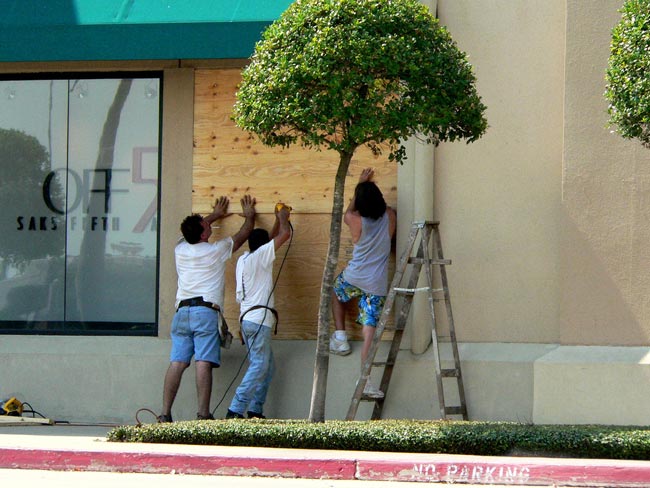
Note: this is Frank Gromling’s third in a three-part series on the 20th anniversary of Hurricane Andrew and its implications. The first part is here, the second part is here.
![]()
 In my past two Coastal View columns, I shared the experiences of being at ground zero during Hurricane Andrew from a personal and business owner’s perspective. Today I am bringing home the lessons I learned in the hope that you will take proper precautions to protect your family and possessions. While the information below is applicable to all Flagler County residents, and any Florida resident, those of you living east of I-95 should consider what follows as critical reading. If you live on the barrier island, as I do, the points made should be considered an essential part of life.
In my past two Coastal View columns, I shared the experiences of being at ground zero during Hurricane Andrew from a personal and business owner’s perspective. Today I am bringing home the lessons I learned in the hope that you will take proper precautions to protect your family and possessions. While the information below is applicable to all Flagler County residents, and any Florida resident, those of you living east of I-95 should consider what follows as critical reading. If you live on the barrier island, as I do, the points made should be considered an essential part of life.
Simply put, there are five critical lessons: storm shutters are essential, have as much insurance as you can afford, there are never enough emergency supplies, telecommunications will not exist, and your evacuation plan isn’t just yours.
Storm shutters are essential
If I had had hurricane shutters on my home and business, I know my losses would have been less severe. We only had been in our home four years when Andrew hit, but that was enough time to install hurricane shutters on all windows and to strengthen all doors, especially the overhead garage door, a notoriously weak entrance point. We didn’t. Nor did I have them on my office. We paid the price. A 16.9 foot storm surge and winds of 155 mph or more would have damaged our home and business regardless, but we’ll never know to what degree storm shutters could have helped.
If your home or business does not have operable hurricane shutters, get them immediately. Plywood over windows and doors, while better than nothing, is only as strong as the thickness of the plywood and the method of installation. Today, both our home and my business have hurricane shutters. In fact, one of the reasons I selected my office location in Flagler Beach is because it had folding aluminum shutters in place.
Have as much insurance as you can afford
I was fortunate to have excellent property and wind insurance, which were not separated back then, for both our home and my business. No homeowner or business owner should be without as much property and wind insurance as you can afford. One type of insurance many business owners don’t know about or overlook is what is called business interruption insurance. If your business operation is interrupted for any of a variety of reasons, this insurance policy provides a financial stream to bridge the gap, thereby allowing you to recover and return to productivity. Talk today with a professional insurance agent about how to protect your family and business assets. Yes, it can be expensive, and you may never need it. But need it once and not have it and you will regret it for a long time. And finally remember to bring your insurance policies (wrapped in sealed plastic bags), and your insurance company’s telephone numbers.
There are never enough emergency supplies
We all have read about the supplies we should have on hand. Many of us actually keep an emergency supply of food, water, flashlights, batteries, medicines, and such. If you don’t have a separately designated supply of these items, find a place in your home and set it up as your emergency cache. Follow the recommendations available from a number of sources, such as this one from Channel 13. At my house we rotate through our supplies, consuming and replacing them so they always stay fresh and usable. While this isn’t really necessary with dried foods, it is a good policy to ensure that everything is edible and drinkable when you need it.
Two other important supplies are a quality first aid kit and a fire extinguisher. From experience, I know that injuries happen easily and often while cleaning up after a storm. Having a fire extinguisher on hand is a sound precaution if you are using propane stoves or charcoal grills, or have a generator creating electricity for selected purposes, such as lighting, refrigeration or cooling. And always cook outside.
One last supply to remember prior to the storm is to fill up all vehicle gas tanks. Do this early enough so you are not wasting precious preparation time waiting for the agonizingly slow moving lines of traffic to let you to the pump. You’ll need the gas both to get out of the storm path and, when it is long past, to operate your vehicles while damaged gas stations come back on line with electricity needed to pump gas again.
Telecommunications will not exist
Even with the best cell phones, there will be coverage gaps when towers topple or increased emergency use clogs the systems. Remember to use cell phones sparingly to keep the systems that are working available for those who need emergency help.
Television and radio stations may be off air; or your electricity will be off. Your ability to receive news updates will be severely limited. Buy a weather alert radio which receives special emergency broadcasts. And remember to have sufficient batteries to operate it.
Mail service will be non-existent. UPS or FedEx delivery services will wait until the damage has been cleared before they roll their trucks.
Last, tell family members or friends who live outside the state where you are going and how to contact you. And bring all of the important contact information you can so you are able to reach out to those who can help you or will want to know about your safety.
Your evacuation plan isn’t just yours
If you look at the evacuation plan for where you live, such as the one for Flagler County, you will realize quickly that you will have lots of company on the roads. Think of the traffic you will encounter trying to get off the barrier island from The Hammock, Beverly Beach and Flagler Beach. And all of those people will be joining tens of thousands from Palm Coast and Bunnell, all heading away from the approaching storm. If the hurricane is large enough and strong enough, something like 100 miles across and bearing 140mph winds, or greater there will be hundreds of thousands of people on the roadways, all with one purpose – to get out of harm’s way.
The decision to evacuate is an important one. On one hand you may want to stay to protect your property. On the other hand, staying may only risk your life and other family members’ lives. Keep in mind that emergency service personnel have no obligation to come to your aid if you fail to comply with a legal evacuation order.
When evacuating, give yourself plenty of time, take only what you need, and know where you are going. Have a plan and exercise it. If you have pets, know what shelters will accept them.
Take important documents and items with you in sealed plastic bags. These might include property deeds, insurance policies, medicines and prescriptions, credit cards, and do not forget to take cash. Banks and ATMs will not be working in a storm-ravaged area for many days or weeks.
A few final thoughts
After Hurricane Andrew, Florida established a higher building code for homes–the most rigorous building code in the nation–but it is still only for 120 mph (a mid-category 3) winds. Homes built after 2002, therefore, are built to withstand hurricanes better than before. Realistically, a category 3, or higher, hurricane that roars ashore in Flagler County will cause serious damage all along the barrier island and to the eastern portions of the County.
With many homes along the coast built before the 2002 code changes, damage will be severe, including roof failures. A tidal surge of 15 feet or higher will flood most parts of the island, including the downtown area of Flagler Beach. Electricity, which often goes out during normal thunderstorms, will be non-existent for days or weeks. Wind-driven beach sand will blast everything in its path. The Flagler Beach Pier will suffer serious structural damage. Trees, parts of homes, and other debris will crash into businesses and homes, adding damage to that caused by high winds and torrential rains. What was once a thriving place to live, work and play will become a ghost town until the slow process of recovery follows an appraisal by emergency personnel.
I’ve never been a doom and gloom kind of guy. But, the reality of a major hurricane striking my home and place of business, coupled with the experience of Andrew and several other large hurricanes, has taught me that, when it comes to hurricanes, having a clear picture of what can happen is essential to being prepared to survive them.
Here are five Internet resources for more helpful information:
- Hurricane history for Flagler Beach
- Hurricane shelters for Flagler County
- Hurricane Checklist
- Flagler County’s Emergency Services Material
- FlaglerLive.com’s article about hurricane preparation
And, finally, here is the Saffir-Simpson hurricane scale:
A category 1 hurricane has winds of 74-95 mph.
A category 2 hurricane has winds of 96-110 mph.
A category 3 hurricane has winds of 111-130 mph.
A category 4 hurricane has winds of 131-155 mph.
A category 5 hurricane has winds of 156 mph and greater. (Category 3, 4 and 5 hurricanes are also classified as major hurricanes or intense hurricanes.)
Until next week, be well and get your hurricane plans into top shape. When you have done that, take one small step to give nature a hand.
![]()
Frank Gromling is the owner of Ocean Publishing in Flagler Beach. Reach him by email here.





























Linda says
Thank you Frank for three great columns. Your advise also applies to all other natural disasters.
The fires of 1998 bring this to mind. The entire County was evacuated, we all learned from that
4th of July. Linda
initialjoe says
I fully agree with the “never enough supplies” section. I saw the eye of both Hurricanes Frances and Jeanne and ran out of supplies after both of them. Disney is a good place to go BTW. They usually accept refugees and their pets. Thanks for the great writeup.
Geof L says
Good info for the next storm too. Now is the best time to restock on basics at big chain stores since they restocked so fast. For items like a bug-out bag for your dog, go to sites like http://www.hurricanecamping.com since chain store still have not figured out that our pets are important too